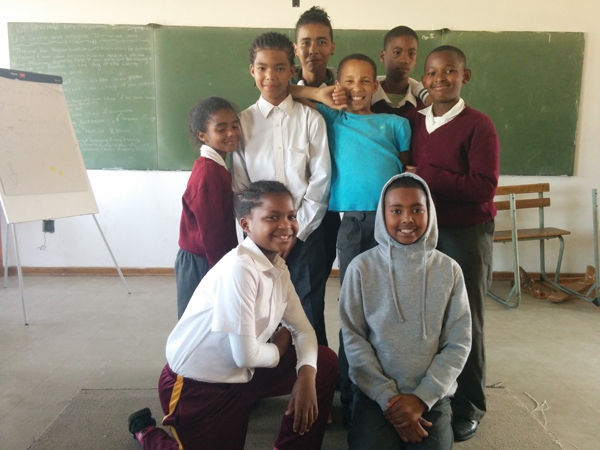Mannenberg duo teach more than music

In a classroom at Phoenix Secondary School in Mannenberg, GroundUp spoke to Zakie Johnson and Aziza Davids. They are skilled participants working for the Community Work Programme, a poverty relief government initiative that provides a job safety net for the unemployed. The average daily rate is R63,18.
Johnson’s passion is music. He teaches music to students at Silverstream High.
“It’s give and take,” he explains, students come with their requests and Johnson learns the chords to their favourite songs. He then teaches them these chords and they all share his guitar to learn.
“I have a passion for this community, for uplifting and developing the youth. I use the arts as a tool to open up their minds and see that there is more than just what they see every day — the gangsterism and the drugs and all of these social illnesses.”
“It’s just to show them that there’s more life to Mannenberg, because all they know is poverty,” says Davids.
Davids teaches vocal training to students from Saambou Primary School. A singer growing up in Mannenberg, Davids doesn’t see a future for herself as a performer. “If I don’t make it, one or two of my kids that I teach will make it, because I will make sure that they make it.”
“I almost went through the same mind set,” says Johnson. “I told myself, I’m finished, I must give way for someone else. Then I realised, no, I’m not finished I’m onto the next level — producing. And that is exactly what we are doing, we produce the learners who become performers. Whatever they carry through their life, they will remember us”.
It is important to know the kids, explains Davids. “There’s a reason why this one has anger issues, why that one is bossy.” She involves herself in their lives in order to understand their outlook. Her role extends far beyond that of a music teacher.
“One of my pupils went astray, and when I saw him again, the pupil said, no, he’s a gangster. They stabbed him in his arm and in the back. He’s only 14 years old,” she says. “So that is my challenge: to keep them off the streets and to tell them this is wrong, this is right, this is the way you want to go.”
“You have to be a mentor; at times, you have to be a father,” says Johnson.
But, he warns, you have to be careful not to fill positions that are lacking in their lives. Teenagers are under an extreme amount of pressure and if they are too reliant, a wrong move could be devastating.
Johnson and Davids regularly make house visits to check up on their students and inform their guardians. Davids tells how heartbreaking it was to see two of her most promising students living at the back of a house, in a room with broken windows and holes in the walls. “We started putting parcels of food together, clothing and stuff. Their mom cries every time I go there.”
“I always ask my kids, do you want to live the way you live now or do you want to go bigger and better? They have big dreams and I’m only here to help them,” says Davids.
Davids and Johnson are part of the Rosa Choir. This gives the students exposure and the opportunity to perform outside of Mannenberg. “They get noticed through the choir,” says Davids. “One guy wants one of my boys to perform for the Kaapse Klopse. He wants him, no one else.”
“We take them to auditions, show them the ropes,” says Johnson. The two inspire their students with their own stories of how they became musicians.
Before Johnson first laid his hands on a guitar, he used to follow his brother around in the “political scenarios” (as he calls it) in the 1980s. It was only when he came across the Mannenberg drama group that he started to discover his passion.
“I tried to get into UCT, I tried to get into UWC, but no luck,” he says. “Yet my heart is in the community and all the knowledge I gained was in this community.”
Davids came from a troubled background of drug and alcohol abuse. “Growing up in Mannenberg I can’t say is always sunshine. I’m trying to keep kids off the streets because I know what it does.”
“I see people that used to do drugs with me; some died, some look like walking death.”
Today, students visit her after class and spend the day playing, eating and mucking about until 8pm. She then goes to drop each one at home. “They are almost like my kids. I cry over them. They make me crazy, but I love them to bits.”
Teaching music is a way to show students that the arts can be a feasible career path, not just a hobby, believes Johnson. “If you’re not an academic or a practical person, there is always music and the arts. In this industry you can buy your mother a house, you can sort out your family.”
Davids sums up: “What we teach is more than just music, it’s about making the kids stronger, because a winner isn’t someone who always wins. It’s somebody that never gives up”.
“With the Community Work Programme, that’s the relief,” says Johnson. “I can still cover my passion and earn a staple so that I can breathe and pay rent and things like that.”
Next: Week in activism

This article is licensed under a Creative Commons Attribution-NoDerivatives 4.0 International License.


